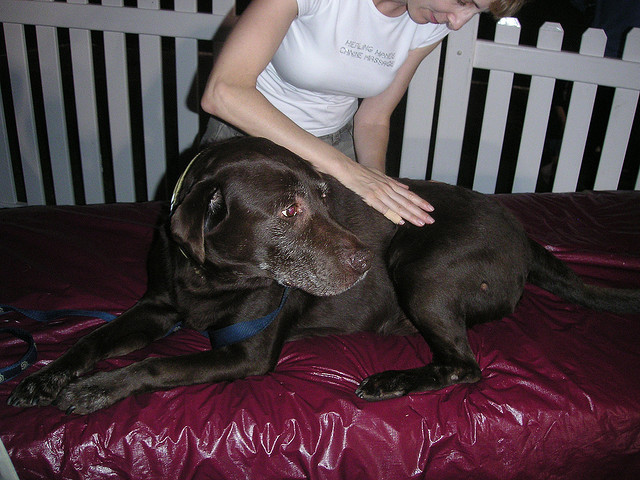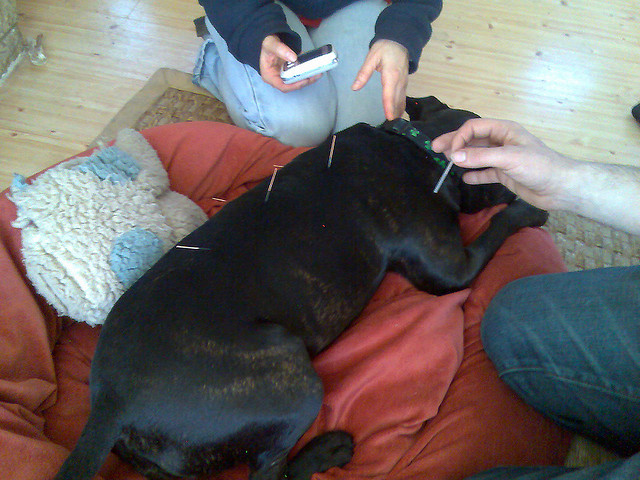Often, over-the-counter or prescription drugs just don’t seem to alleviate the pain caused by disease, illness, or injury as well as we would like. Have you thought about using alternative medicines to alleviate pain in your dog? Dr. Christina Chambreau, DVM, is a homeopathic veterinarian, associate editor of Integrative Veterinary Care Journal, author and educator. We asked her your questions about using alternative pain relief.
Why should dog owners consider using alternative forms of pain relief?
CC:
- Cheaper
- You can do it at home anytime any pain appears, not waiting until it is severe enough to warrant a veterinary visit.
- By learning alternative forms you can do at home, you learn more about watching for early warning signs of internal imbalance so you can help your dogs live a longer, healthier life. (See my site for list of them).
- Some alternative treatments for pain are 100% safe with no side effects, while most drugs have side effects, especially with long term use.
When I had merely my conventional training, my goal was to relieve pain. Integrative veterinarians have the goal of relieving the pain now, and deeply curing so the pain is completely gone (can get this result in many dogs).
What are some of the alternative medicines/ways to alleviate pain?
CC: I suggest that everyone with a dog have R & RR – Reiki and Rescue Remedy. It’s a 100% safe [and something] that you can learn.
- Reiki (which can take the “bad” out of vaccines and any needed drugs, or even make food healthier)
- Flower essence therapy, especially Rescue Remedy from the health food store that is available almost everywhere. Buy the people one, not the pet one. Put one drop in a separate water bowl. Put 10 drops in a cup of water [to make a] compress for painful areas, rinse the eye, or soak a painful foot, etc. Put 4 drops in an ounce of water in a jar and give a few drops in every meal and every few hours in between. You cannot use it too often. It is totally safe. It is great for people too – for anxiety, stress, shock, grief and more.
- Massage
- HTA
- Tellington TTouch
- Acupressure

[The following] may have some side effects if used incorrectly, so you need to read books, take classes or purchase products formulated for animals.
- Herbs
- Homeopathy
- Chinese herbs
- Laser
And finally these need to be done by a veterinarian:
- Chiropractic
- Acupuncture
- Deep seated homeopathic or Chinese herbal treatment
- Osteopathy

Are these treatments more effective/less effective/about the same as conventional?
CC: In my experience of 33 years in holistic medicine, these treatments are usually more effective than conventional drugs. If they do not work, then you can go to drugs. For instance, a cat had major reconstructive surgery on the side to remove a fibrosarcoma caused by a rabies vaccine. The surgeon said the cat would be in severe pain for weeks and prescribed very heavy duty pain killers, which made the cat nauseous after the first dose, so the client used Reiki and homeopathic Arnica and the cat had no side effects, had no pain and only needed them for 5 or 6 days.
Since our dictum is to “do no harm” it makes sense to try the gentler approaches first. Also, conventional treatments will rarely cure the problem causing the pain and there is a fair chance that alternative approaches will.
Some of these are things dog owners can get over the counter. Should they still take their pet to the vet?
CC: As they learn alternative healing methods, they have to judge the severity of a problem. They can always start with Reiki and other 100% safe approaches. Hopefully they will be working with an integrative veterinarian who will help them decide if they need to be seen or not. For instance, if a male cat has passed not even a drop of urine and is straining – a veterinary visit is needed as he may be blocked.
If their regular vet does not do alternative medicine, is there a website where dog owners can find a vet in their area?
CC: I strongly recommend finding an integrative veterinarian with whom to work. This is a person trained in many different approaches, including using conventional drugs only when absolutely needed. Working with one can increase the chance that your cherished companion can live a long and healthy life after recovering from this current problem. There are good ones and great ones, and a few homeopathic veterinarians will consult by phone or email.
You can go to the web sites for each type of holistic practice and use their referral list to find one near to you. Many practitioners are members of only one or two of the organizations, so you do need to go to every site to find who is near you:
- Wide range of other treatments: American Holistic Veterinary Medical Association and College of Integrative Veterinary Therapies
- Homeopathic veterinarians (these can often help you by phone if no other holistic practitioners are nearby that you like): The Academy of Veterinary Homeopathy and Dr. Pitcairn.
- American Veterinary Chiropractic Association
- TCVM (Acupuncture and Chinese medicine): The International Veterinary Acupuncture Society, American Academy of Veterinary Acupuncture, and Traditional Chinese Veterinary Medicine
- Herbal – Veterinary Botanical Medicine Association
- Postural rehabilitation – dogs and horses – (a handful are in Europe)
There are also lots of practitioners and approaches that are used by trained people that you can find by searching the Internet.
About the Author
Based in Wilsonville, Ore., animal lover Kristina N. Lotz is a Certified Professional Dog Trainer – Knowledge Assessed (CPDT-KA). She is the founder of A Fairytail House. In her spare time, she trains and competes in herding, agility, obedience, rally, and conformation with her Shetland Sheepdogs. She smartly married a Veterinary Technician, who helps keep the fur kids happy and healthy, and provides a quick resource for articles.
